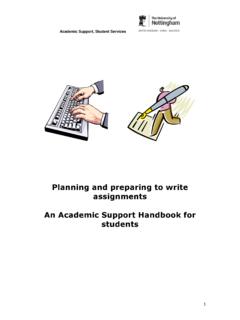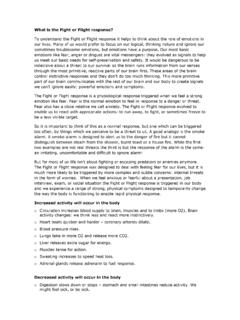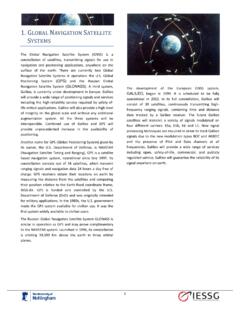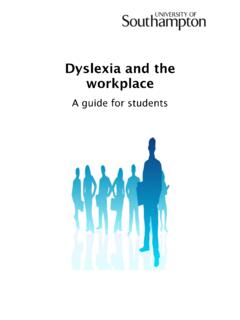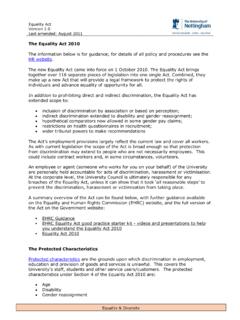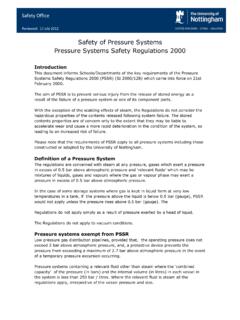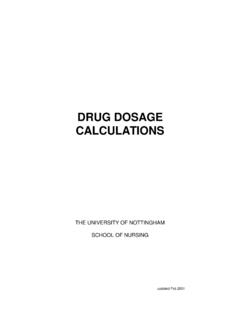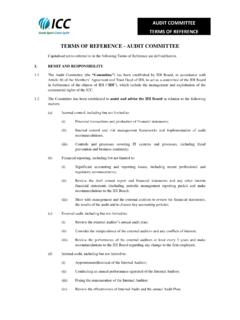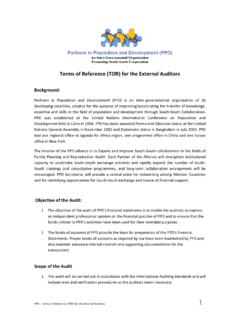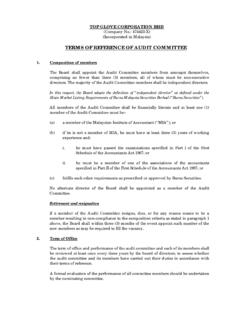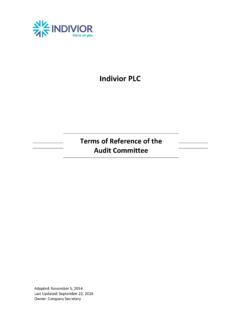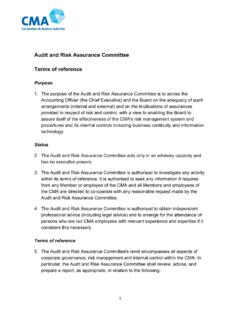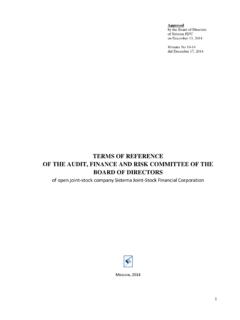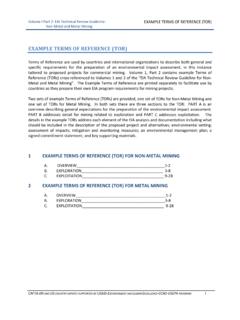Transcription of Terms of Reference of the Internal Audit Service 1 ...
1 Feb 2018 Page 1 of 4 Terms of Reference of the Internal Audit Service 1. introduction Internal auditing is an independent, objective assurance and consulting activity designed to add value and improve an organisation s operations. It helps an organisation accomplish its objectives by bringing a systematic, disciplined approach to evaluate and improve the effectiveness of risk management, control and governance processes. The Internal Audit Service is responsible for giving assurance to Council, through the Audit and Risk Committee, and the Vice-Chancellor, on the arrangements for risk management, control and governance, and value for money.
2 It also assists management by evaluating and reporting to them on the effectiveness of these arrangements. It remains the duty of management, not the Internal auditor, to operate these arrangements. 2. Scope All the University's activities, funded from whatever source, fall within the remit of the Internal Audit Service . The Internal Audit Service will consider the adequacy of arrangements necessary to secure propriety, economy, efficiency and effectiveness in all areas. It will seek to confirm that management have taken the necessary steps to achieve these objectives and manage the associated risks. The scope of Internal Audit work covers the whole of the University s risk management, control and governance arrangements and any aspect of VFM delivery.
3 This does not imply that all areas will be subject to review, but that all will be included in the Audit risk assessment and hence considered for review following the assessment of risk. The work of other providers of assurance on the University s activities will be taken into account. It is not within the remit of the Internal Audit Service to question the appropriateness of policy decisions. However, the Internal Audit Service is required to examine the arrangements by which such decisions are made, monitored and reviewed, and related risks identified and reviewed. The Internal Audit Service may also conduct any special reviews requested by Council, the Audit and Risk Committee or the Vice-Chancellor, provided such reviews do not compromise its objectivity or independence, and take account of the impact on achievement of the approved Audit plan.
4 Limited assurance services may also be provided to some organisations related to the University; the nature of this assurance is agreed in advance in each case. 3. Responsibilities The Director of Internal Audit is required to give an annual opinion to Council and the Vice-Chancellor, through the Audit and Risk Committee, on the adequacy and effectiveness of the arrangements for risk management, control and governance; and for economy, efficiency and effectiveness (value for money) within the University; and the extent to which Council can rely on these. The Director of Internal Audit should also comment on other activities for which Council is responsible, and to which the Internal Audit Service has access.
5 Feb 2018 Page 2 of 4 To provide the required assurance, the Internal Audit Service will undertake a programme of work, based on a strategy authorised by Council on the advice of the Audit and Risk Committee. The programme will evaluate the arrangements in place to: (a) establish and monitor the achievement of organisational objectives (b) identify, assess and manage risks to those objectives (c) advise on, formulate and evaluate policy within the responsibilities of the Vice-Chancellor (d) ensure compliance with policies, laws and regulations (e) ascertain the integrity and reliability of financial and other information provided to management and stakeholders, including that used in decision making (f) ascertain that systems of control are laid down and operate to promote the economic, efficient and effective use of resources and to safeguard assets.
6 4. Standards and approach The Internal Audit Service 's work will be performed with due professional care. It will comply with the Chartered Institute of Internal Auditors International Professional Practices Framework, and also with the HEFCE Memorandum of Assurance and Accountability, including the Audit Code of Practice, and any relevant requirements of the Office for Students. To achieve its objectives the Internal Audit Service will develop and implement an Audit strategy that assesses the University s arrangements for risk management, control and governance and for achieving value for money. The Director of Internal Audit will implement measures to monitor the effectiveness of the Service and compliance with standards, through a Quality Assurance and Improvement Programme (QAIP).
7 The Audit and Risk Committee will consider and approve these performance measures and may also seek an independent assessment of the Internal Audit Service 's effectiveness. 5. Independence The Internal Audit Service has no executive role, nor does it have any responsibility for the development, implementation or operation of systems. However, it may provide independent and objective advice on risk management, control and governance, value for money and related matters, subject to resource constraints. For day to day administrative purposes, the Director of Internal Audit reports to the Chief Financial Officer. The Director of Internal Audit shall have right of direct access to the Vice-Chancellor.
8 Within the University, responsibility for risk management, control and governance arrangements and the achievement of value for money rests with Council and management, who should ensure that appropriate and adequate arrangements exist without reliance on the University's Internal Audit Service . To preserve the Feb 2018 Page 3 of 4 objectivity of the Internal auditors professional judgement, it is for management to determine whether or not to accept Audit recommendations, to recognise and accept the risks of not taking action, and to implement recommendations. 6. Rights of access The Internal Audit Service has rights of access to all the University's records, information and assets which it considers necessary to fulfil its responsibilities.
9 Rights of access to other bodies funded by the University should be set out in the conditions of funding. The Director of Internal Audit has a right of direct access to the President of Council, the Chair of the Audit and Risk Committee and the Vice-Chancellor. In turn, the Internal Audit Service agrees to comply with any requests from the external auditors and HEFCE Assurance Service /Office for Students for access to any information, files or working papers obtained or prepared during Audit work that they need to discharge their responsibilities. 7. Relationships with other assurance providers The Internal Audit Service will liaise with other assurance providers internally and externally to optimise the assurance provided to the University.
10 8. Reporting The Director of Internal Audit must submit an annual report to Council and the Vice-Chancellor through the Audit and Risk Committee. The report must relate to the University s financial year, and include any significant issues up to the date of preparing the report which affect the opinion. The report should give an opinion on the adequacy and effectiveness of the University s arrangements for: (a) risk management, control and governance, and (b) economy, efficiency and effectiveness (VFM) and the extent to which the Council can rely on them. The final annual report to Council will also be shared with HEFCE/ Office for Students as required.
